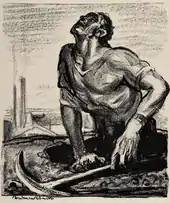National coal strike of 1912
The national coal strike of 1912 was the first national strike by coal miners in the United Kingdom. Its main goal was securing a minimum wage. After 37 days, the government intervened and ended the strike by passing the Coal Mines Act, establishing a minimum wage for the first time.[1]

The dispute centred upon an attempt by the Miners Federation of Great Britain, the main trade union representing coal miners, to secure a minimum wage for miners in their district and replace the complicated wage structure then in place which often made it difficult for a miner to earn a fair day's wage. The same issues had caused a major dispute the previous year in South Wales and had become a national issue. The strike was a repeat of the unsuccessful strike of 1894 which also sought a minimum wage.
The strike began at the end of February in Alfreton, Derbyshire and spread nationwide. Nearly one million miners took part. It ended on 6 April after 37 days.[2] The strike caused considerable disruption to train and shipping schedules.
External links
- Peter Gill. "National coal strike".
- Michael Kelly. "Nostalgia: 100th anniversary of the national miners' strike". The Journal.
References
- Brian R. Mitchell (1984). Economic Development of the British Coal Industry, 1800-1914. CUP Archive. pp. 190–1.
- The Manchester Guardian (8 April 1912).